#takuan soho
Text
Vagabond | バガボンド Shit post ❤️
credit is in alt text
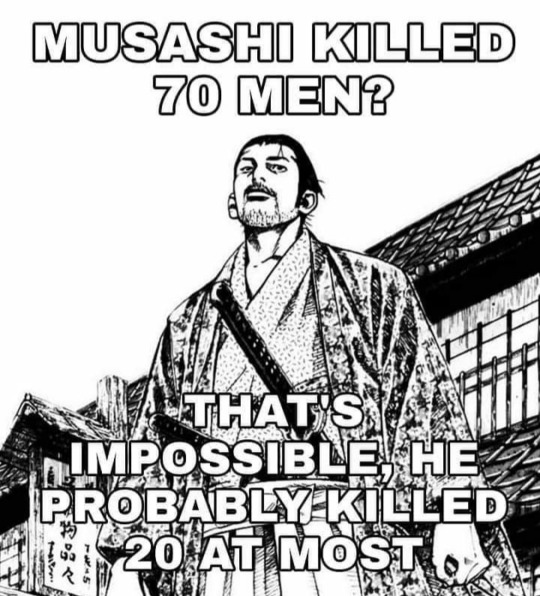
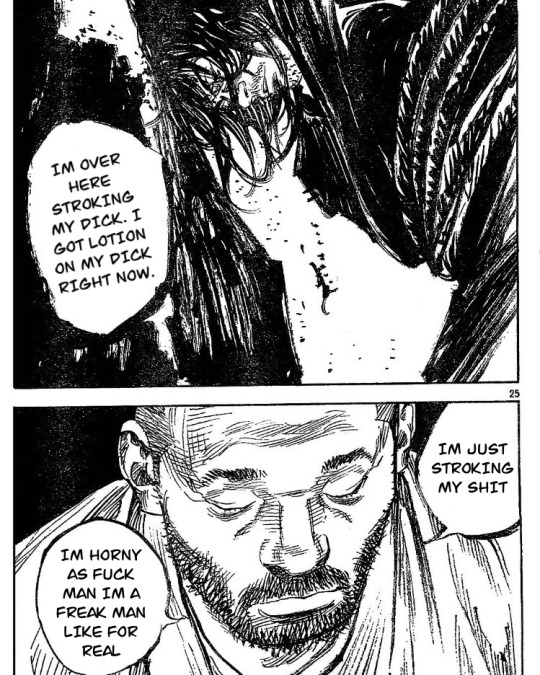
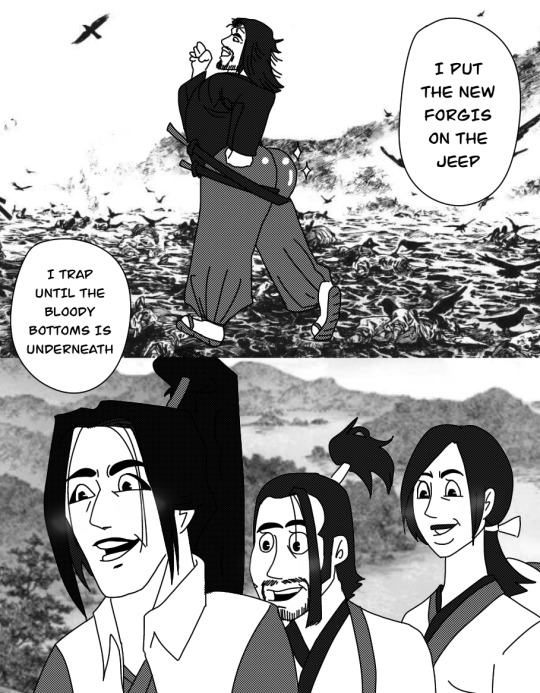


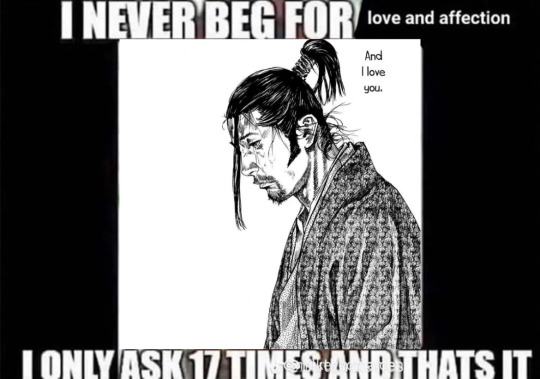


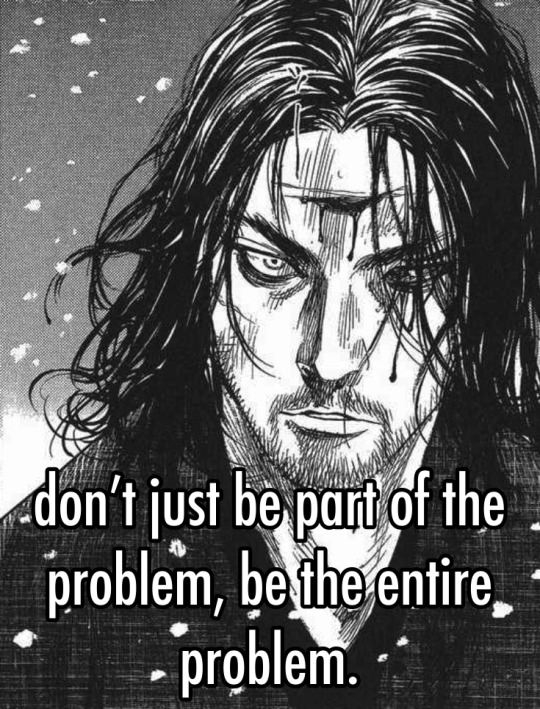

#vagabond#vagabond manga#vagabunda#vagabundo#バガボンド#memes#shitpost#text post#musashi#musashi miyamoto#sasaki kojiro#matahachi hon’iden#otsu#takuan soho#shinmen takezo
65 notes
·
View notes
Text
"See everything in it's entirety, effortlessly."
- Takuan Sōhō
5 notes
·
View notes
Text
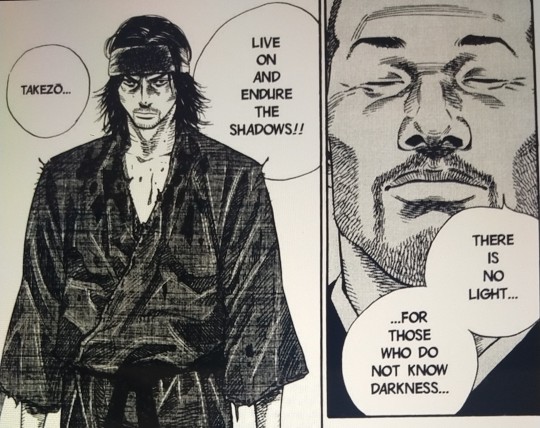
1. Stuff I learned from reading Vagabond.
Estimated reading time: 16 minutes.
Vagabond is a manga (Japanese comic) written and drawn by Takehiko Inoue about the life of the most famous swordsman from Japanese history, inspired in true events and characters from that time (around 1600's).
I'll write some quotes and then my interpretation, my input, and stuff I thought about.
I divided the post in parts so it can be read a bit at a time.
1
------------------------------------------------------------------------------
Quote:
Takuan: “There is no light for those who do not know darkness. Live on and endure the shadows Takezou! And brightness shall come your way”
Interpretation:
Not everything in life is happiness, and happiness as a goal is a bad idea because during many moments in life there will be unavoidable tragedy (earthquakes, the death of a loved one, an illness, breaking up with your partner), and we have to do stuff like working 8 hours a day which is not usually enjoyable.
If we accept that a part of life is “suffering” and/or doing things we don’t like, we will have a better time in life because we won’t fight and try to avoid something unavoidable. Trying to avoid things you have to do only leads to stress, and to becoming a good for nothing. For example when you have to do a bunch of work, but instead of doing it, you start checking social media or procrastrinating somehow else, eventually you just feel more tired and stressed than you should be and haven't got any work done.
Experiencing tragedy is a natural thing, if we endure and overcome tragedy, and learn from it, we will be able to have amazing moments in life, and appreciate them more.
Quote:
Takuan: “Don’t be preoccupied with a single spot. See everything in its entirety, effortlessly. That is what it means to truly see.”
Interpretation:
If you focus too much on a single thing, it can be at work, at a hobby, doing whatever, you might miss the bigger picture.
Sometimes when working on solving a problem, for example, healing lower back pain (it’s a good example), we think our lower back is the problem, and we think we need to apply heat, rest, and then strengthen our lower back. In many cases, we need to strengthen the parts around the lower back that support it, the legs and glutes, work on having a better posture by strengthening our chest, the upper back, and the abdomen.
Sometimes thinking that a very specific thing is the problem won’t let us see the stuff around it that could be what’s actually causing the problem.
This quote could also mean: after you practice something a lot, and learn a lot of information about it, part by part first, practicing those parts separately, then all parts together at the same time, eventually you’ll be able to “truly see”, to be really good at something, and to get the bigger picture easily, applying all those individual skills without thinking about them consciously.
This can also be applied to life in general, the more information we learn (like science facts and useful practical information), and the more we practice things, all becomes easier in general.
2
------------------------------------------------------------------------------
Dialogue:
Musashi: "These wicked thoughts… they're distracting me from the way of the sword."
Takuan: "Wicked thoughts?" "Are you suggesting that Otsu (a female character) is wicked?"
Musashi: "No, I didn't say that! It's just that… My thoughts about her are."
Takuan: "Your thoughts aren't wicked. They're perfectly natural feelings. You think these feelings go against the way of the warrior. But they only get twisted and bent out of shape when you repress them and try to keep them contained."
Interpretation:
Absolutely any thought that goes through your mind is natural, and it’s not a good idea to think they’re wrong, or that something’s wrong with you because of having those thoughts. Everyone will have many useless thoughts yes, and thoughts that you shouldn’t pursue. If you keep thinking about something too much, it's likely you'll eventually do something about it. For example, when you do something about a thought that will cause trouble (like messaging with your ex, or like taking steps that can lead you towards cheating on your partner with someone from work, or like stealing something).
Whenever there’s a thought that is a bad idea, or “useless”, the best thing is to just keep doing something else and see that thought from a distance, it will go away eventually. To achieve this, it’s useful to have things to do (like hobbies, or work), and engaging in those activities with minimal distractions. Meditation is also a useful practice to improve concentration and stop thinking about so many things at once.
Even if thoughts are outside of our control, we can bias ourselves into having better and more useful thoughts (or, worse ones). When we engage in a certain activity for a long time, it will be natural to have ideas related to that activity, and less ideas about something we're spending less time doing. We actually have a huge amount of control when it comes to influencing ourselves in a positive or negative way.
To give an example, spending a lot of time on social media will worsen every aspect of daily life because it will increase our negative thoughts, such as thinking the world is awful, thinking people are stupid (because people mostly post impulsive things), thinking we want something that others have (possessions and experiences). It will increase our anxiety (because we will want to keep looking at our phones) and it will make us feel unsatisfied because of all these thoughts, and because it messes up with our dopamine (reward) system, we will feel more tired and uninterested in life in general.
Quote:
Takuan: “Once your heart is preoccupied, your sword will not be true. Then you will die.”
Interpretation:
Engage in what you’re doing, try not to get distracted, and try to enter into the state of flow* at least once a day.
When we’re doing a task, such as work, reading, or playing videogames, if we keep looking at our cellphone for whatever reason, usually our productivity decreases more than 60%, we take a lot longer to finish what we’re doing, we don’t learn as well what we’re doing, and we get a lot more tired.
If you don’t believe me, watch yourself carefully next time this happens, and then try to put your phone in a drawer in silence, at least for 1-hour periods (also avoid checking any social media early before doing other things, leave that for the afternoon, or just don't), if you do this often, you’ll see what I mean.
When we’re too distracted and don’t practice doing things with no interruptions, we won’t get good at doing anything, such as work, a sport, a board game, anything.
This skill is like a muscle, the more we practice doing activities with no distractions, we will be a lot better at it, we will make less mistakes. Being in the zone* like many sport athletes while doing anything feels great and is great to work this skill.
*Being in the zone, or flow state, is a state of mind in which a person becomes fully immersed in an activity. It usually takes about 20 minutes before you can access this state. I’ve felt it many times while doing sports, working on character animations, and playing certain video games, games like Tetris or "Bullet Hell" games are really good for practicing this skill. This can be achieved at work if you're not being interrupted every 10 minutes.
3
------------------------------------------------------------------------------
Quote:
Sekishusai Yagyu: “There is no limit to technique. There is always room for improvement.”
Interpretation:
Whatever you do, you can always get better at it if you keep working on it in a smart way.
Sometimes simply practicing the way one's used to won’t help improve much though. Different approaches, learning different information, and learning skills about different subjects will increase one's general knowledge, and you’ll become better at everything in general.
Even people who are "not talented" at something can work hard and get good at it.
As a side note here. Specialization is good, but overspecialization is a bad idea, someone overspecialized will have a very narrow understanding of the world. An example can be a medic who's great at doing surgeries, but doesn't know much about anything else.
Quote:
Inei Hozoin: “Swimming in the middle of an ocean, one can never realize how vast it truly is.”
Interpretation:
Paying too much attention to one detail, and we’ll miss the bigger picture.
We usually try to achieve things by doing whatever our body and mind dictate at that moment. We can try taking a short break, investigating, thinking it through and then acting. It's most likely this will bring better results.
Quote:
Sekishusai Yagyu: “Invincible. It’s merely a word. To be “invincible”. The more you think about it. The more you squint your eyes in desperation to see, the more obscured the answer becomes.”
Interpretation:
Sometimes we get way too fixated to some ideas or goals.
It’s usually hard to distance ourselves from some ideas because of our culture, our environment, and our biology. I’ve found it very useful to learn basic psychology, philosophy, and biology to better understand myself, other people, and the world. Learning facts from science is also hugely important if we want to better understand everything in general.
Words are a huge simplification of objects and concepts that we probably don’t understand fully. For example, the word “tree”, we use it to refer to a zillion amounts of trees, small trees, big trees, cherry blossoms, oak trees, etc. We can be very biased due to these big simplifications our language does, and because of how each one of us uses language differently.
Taking a distance from our own ideas, our dreams or goals, our usual activities, and learning about random facts, reading a good novel, all these will give us a lot of new insights and will help to avoid being so fixated with the same stuff that can cloud our judgment a lot. What we do daily or often causes us to think or behave in a certain way or to have a specific ideology or tendency, doing something different can have a huge positive impact and help us better understand many things.
Quote:
Musashi: “The “me” in your mind. The story in your mind. That story reflects your own self, your true self. It reflects you as you are now.”
Interpretation:
Be careful, do not think dishonestly, understand what truly is and isn’t.
Sometimes we believe that other people are just like us, and that their situation is like ours, this is not always the case. Talking with people, being honest with them, really listening to what they say, having deep conversations can provide a lot of insights about other people's lives, feelings, and beliefs. Some stories (novels, series, etc.) do the same, but you must pay close attention and ponder on it to really get it. For example, watching some youtubers analyzing characters and events from different series turns out to be a great place to learn.
By understanding that every person is in a different environment from us and have different biology from ours, we can truly get that some people are going through something completely different from us.
Another example; being stressed, angry, or tired won’t leave you with any resources to have empathy for others. I’ve found out I’m really tired and unfriendly right after work. Also, if I use my cellphone (or social networks) a lot during the day, I end up being more moody and tired than I should (it consumes a huge amount of energy and time if you analyze and experience it objectively).
We all have different biases, there’s no such thing as an “unbiased” person or thought, but we can try to better understand everything and have a less biased judgement.
4
------------------------------------------------------------------------------
Dialogue:
Inei Hozoin: “Young one, you hold such aggression in you. I thought you were going to kill me.”
Musashi: “You’ll have to excuse me, but, you have it all wrong. I felt like you were going to strike me with that hoe. Or was I just imagining things?”
Ine Hozoin: “Bah, you’re still wet behind the ears… It’s that clumsy bloodthirst of yours… Me as well as others—we are only mirrors reflecting your own bloodthirst… Your own bloodthirst turns everyone you encounter against you.”
Interpretation:
The way we behave (usually an unconscious thing) can cause others to be uncomfortable, or even aggressive to us. I try to be more aware of the way I look at other people, what I say, and sometimes even about my body language. I can remember times when other people, women and men have seemed to be troubled by me being there with them (ha). It’s usually a 50/50 thing, it’s not only about you, other people can have upsetting behaviors. But being more aware of the way we behave around other people can help everyone have a better time, simply by staring at someone for a couple of seconds at the wrong time and place, we can make them feel very uncomfortable (at the gym or at work for example).
We can all have a better time by trying to be a bit more easy going. This isn’t easy, it will take a lot of practice. Learning more about people and having more empathy takes time.
*There's a book named The Definitive Book of Body Language by Allan and Barbara Pease that helped me understand a bunch of stuff after reading it and then putting what I had learned into practice a little at a time. I noticed I did a bunch of stuff that was very obvious and that could upset other people. It's a lot of fun seeing what other people do, and how some are very obvious with their body language, some aren't, and some are really hard to figure out.
Quote:
Takuan: “Musashi, you’ve become kinder. You’re getting stronger I see. All truly strong people are kind.”
Interpretation:
Self-confidence is a result from learning information and technique through time, and also a result from being honest with yourself, with others, and from doing things right. There's no need to worry about things like your reputation or about results when you're doing your best and are not lying to other people.
Being kind to others and being generally more calm should come out of those good practices as a result.
Some people confuse being kind with naivety, which is not the case at all, someone self-confident will know how to deal with people that try to take advantage of them by setting limits and stopping them immediately. Besides, being nice to others usually results into them being nicer too, there will always be exceptions.
To further clarify my idea. The “self-confidence” classes or coaches that teach to for example, seduce someone by being dishonest is not real self-confidence, it’s just a pretending game that will only cause a bunch of problems in the long term. On the other hand, assertiveness training is a different thing not to be confused with crappy pretending training, it's something that's useful to many people in many contexts.
5
------------------------------------------------------------------------------
Quote:
“There are always crossroads inside the mind. The middle path is the best.”
Interpretation:
When we tend too much towards something, we become extremely biased and don’t consider options that could be best. Social networks (and internet in general) are a good example, they have an incredibly advanced algorithm that throw at you all information that you want to see that’s related to things you like and things you can like, even if it’s fake information. The algorithm is trying to point you in a very specific direction and pushing you more to be in an extreme end of certain ideas, values, or ideologies (making conservatives more conservative, and making liberals more liberals). Besides, they are mind boggling, exhausting, and don’t leave us with anything useful (maybe with a couple of funny memes).
Before eliminating some choices we can make, it’s great to have input from other sources (even listening to ideas from people we don't like and trying to make sense of them), and try not to always listen so much to our own biases like we usually do.
We should try to find a balance between order and chaos, and try to flow, not limiting ourselves too much so we can keep learning, growing, changing (for the best).
I tend to have too much order in my life, when this happens, I get bored, tired, angry, and think about doing crazy things to find some chaos (which is not a good idea). Some other people's lives are 99% chaos, they sleep under 6 hours daily, never get a bunch of important things done, and have eating disorders since their lives don't have any kind of logical structure or order. They could use more structure in their daily lives so they don't end up just wasting a bunch of time daily and feeling tired, or end up doing a lot of random things that lead to nothing.
It’s great to find your weekly activities where you have order, even writing down a daily schedule if necessary, and finding other activities on some weekdays and weekends that will get you “chaos”, this doesn’t mean you have to go out, get drunk, puke, sleep at 6 am, and feel like your brain is going to blow up the next day. It can be small things like going out with friends for a couple hours, doing something different from the usual with your partner, taking a hike, trying to learn something new, taking a class, traveling somewhere, etc. (things you don't usually do and don't know what to expect of them).
Quote:
Musashi: “What is the meaning of “strength”? It’s to have a mind that doesn’t sway, while continuing to move and change.”
Interpretation:
In order to achieve anything, we need to continuously work on it, progressively (this is probably the most important thing many people don’t get, everything must be worked on starting with baby steps), and not giving up if it’s something important, and something realistically achievable.
This is a hard process, learning new information, practicing, making mistakes, learning from them, making more mistakes, moving on. Becoming our better selves by embracing new information instead of rejecting anything new on the spot and just keeping our old ideas, learning to distinguish from useful and not useful information, lies from truth.
All this needs to be done to have “strength”, this is what you’d need to do to learn a language at an advanced level, to get good at coding, to continuously work on and improve the relationship you have with your partner, to get good at your job, etc.
I have another post where I talk a lot more about this last quote and related ideas:
------------------------------------------------------------------------------
I’ll finish by paraphrasing Musashi from The Book of Five Rings:
-Training morning and evening will give you what will seem to be miraculous skill.
#vagabond#philosophy#health#comics#takehiko inoue#miyamoto musashi#takuan soho#manga#book of five rings#musashi#kojiro#takuan#mental health#thinking#biases#cognitive biases#thinking clearly#psychology#buddhism#britney is free
45 notes
·
View notes
Quote
Preoccupied with a single leaf, you won't see the tree.
Preoccupied with a single tree, you'll miss the entire forest.
Takuan Soho
19 notes
·
View notes
Text
Le Zen des samouraïs
Depuis toujours, j’ai été comme un cours d’eau
Et des nuages flottants.
J’ai vécu à tort dans un temple célèbre.
C’était au printemps, dans les rues violettes.
Je ne veux plus de cela.
Demain matin, je serai au Sud, sur la côte marine.
La mouette blanche ne vole pas du tout
En direction des poussières rouges.
*
Puits montagnard peu profond,
Cela ne me gêne pas,
S’il y a quelqu’un
Qui…

View On WordPress
1 note
·
View note
Text
Il guerriero perfetto usa la sua mente come uno specchio: non insegue nulla, non accoglie nulla, risponde ma non immagazzina.
Takuan Soho
11 notes
·
View notes
Text

Viland Saga // Berserk // Vagabond
“Listen to me Thorfinn. You have no enemies. No one in the world is your enemy. There is no one you need to hurt.”
~Thors Snorresson
“You're going to be alright. You just stumbled over a stone in the road. It means nothing. Your goal lies far beyond this, doesn't it? I'm sure you'll overcome this. You'll walk again...soon.”
~Guts
“Preoccupied with a single leaf... you won't see the tree. Preoccupied with a single tree... you'll miss the entire forest. Don't be preoccupied with a single spot. See everything in it's entirety... effortlessly. That is what it means to truly see.”
~Takuan Soho
11 notes
·
View notes
Text
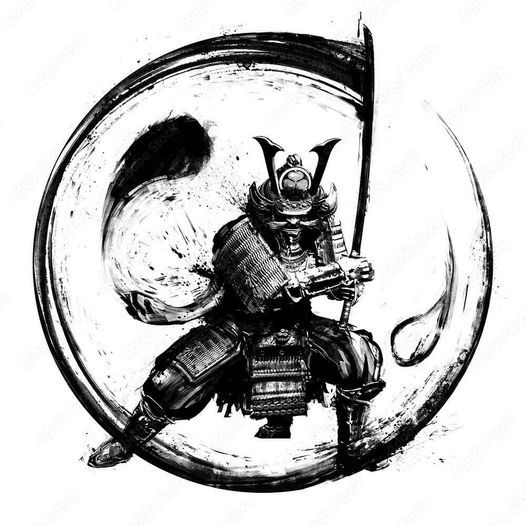
“The mind must always be in the state of ‘flowing,’ for when it stops anywhere that means the flow is interrupted and it is this interruption that is injurious to the well-being of the mind. In the case of the swordsman, it means death.”
- Takuan Soho
28 notes
·
View notes
Note
Idk if this has been answered before, but what character inspired you to create Rohan?
i have talked about it a little bit on other sites, but not here i dont think....I LOVE SHARING MY INSPS
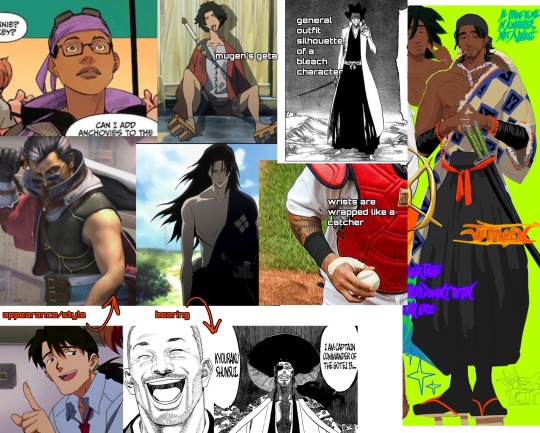
so i do have this pic that kinda shows characters/random elements that inspired rohan. most the actual shit about him is drawn from samurai champloo and vagabond tho
his background is based off jin from samurai champloo. jin's parents die and he is taken in by a dojo, where he trains constantly to compensate for his lack of family and structure. as a result, he is leagues above his peers, who ostracize and fear him. that's literally exactly what rohan is too, except i made rohan's PARENTS run the dojo he's in, and THEY make him train constantly with the reasoning that it will ensure rohan's future. i love themes of alienation in childhood, but i also love when characters are trapped in toxic family dynamics. jin grows into his role as a swordsman though he eventually must leave after he's forced to murder his master, but rohan resents his lack of choice and feels trapped, so despite his skill (that he doesn't appreciate until he comes to hisui) he yearns for a life where he isn't pressured.
personality wise, rohan is mostly based on soho takuan (vagabond), ryoji kaji (nge), and shunsui kyoraku (bleach). they are all easy-going but perceptive characters who, to varying degrees, can cut right into people when they need to. rohan is really similar to volo in some aspects as well, namely in terms of his tenacity. the whole point in originally creating rohan was to ponder the type of character that could realistically befriend someone that selfish and immature. i came to the conclusion over time that volo needs someone who will show him—the real him—a little care and empathy, someone older, wiser, and more mature; but it is imperative that that person must still go to war with volo on his level. and rohan will fight volo over and over until he dies, because that is what reaches volo the best: the determination to stop him. rohan knows this, even if volo doesn't recognize it himself.
other little elements of his character just kind of happened randomly.....such as catcher wrist wrappings to match volo's hisashi iwakuma pitch. he also wears brightly colored, patterned kimono usually typical of women's clothing bc i love ukiyo-e art, where a lot of the subjects are women, courtesans, and kabuki actors, all with intricate, patterned clothing. while the dragonfly print kimono is taken from PLA, most men in warring states/edo period japan typically would wear something more understated for everyday attire. if anyone had something to say about his clothes, he could just kick their ass i suppose lol
3 notes
·
View notes
Text
Eastern Philosophy: Japanese Martial Arts & Mental Development
The martial arts of Japan speak about mental development and also certain mental states or spiritual realizations that allow one to survive confrontation. Three of these mental or spiritual states are fudoshin, junanshin, and mushin. Fudoshin is the realization of equanimity or a state of mind where we are not disturbed by anything. It is like a mountain being stable despite fierce winds circling it. In this state of equanimity, thoughts such as a fear of danger, emotions, or obstacles do not disturb the person. Another mental state is junanshin and this can be translated as “flexibility of the mind.” If one is being attacked or is in conflict, instead of trying to fit a situation into our preconceived ideas of what should be the case, one is able to adapt appropriately, move freely, and not be attached to anything. Another mental state is mushin or “no mind” and this also relates to non-attachment and openness. Again, it is moving freely clinging to nothing. If we have very conceptual ways of thinking during a conflict and we plan what we are going to do to the other person by thinking such thoughts as, “If they punch, I’ll do this. If they grab me here, I’ll do that,” this emits an intent that the opponent can sense. In this case, they can take preemptive steps. Moving freely means not only moving freely physically, but mentally, being completely free. A famous figure of the Rinzai school of Zen Buddhism in Japan was Takuan Soho. He wrote about martial arts and Zen and also spoke about moving freely, being attached to nothing, and clinging to nothing.
3 notes
·
View notes
Text
★ Roger's Audiobooks (U—Z) ★
UPDATED: February 06, 2024
If Audible isn't your thing, Roger's audiobooks can also be found at these other sites but selection varies from site to site:
Apple Books ☆ Audible ☆ Audiobooks.com ☆ AudioBooksNow.com ☆ AudiobookStore.com ☆ Barnes & Noble ☆ Binge Books ☆ Chirp Books ☆ Downpour ☆ Everand ☆ Google Play ☆ Hoopla ☆ Libro.fm ☆ Overdrive + Libby ☆ Rakuten Kobo ☆
Links to more of Roger's Audiobooks:
A-D ☆ E-H ☆ I-L ☆ M-P ☆ Q-T ☆ U-Z
--------------------⋆⋅⋆⋅☆⋅⋆⋅⋆--------------------
• Undisruptable: A Mindset of Permanent Reinvention for Individuals, Organisations and Life by Aidan McCullen, foreword by Dee Hock
• The Unfettered Mind: Writings from a Zen Master to a Master Swordsman by Takuan Soho, William Scott Wilson (translator)
• The Untamed by Max Brand
• Urgent!: Strategies to Control Urgency, Reduce Stress and Increase Productivity by Dermot Crowley
--------------------⋆⋅⋆⋅☆⋅⋆⋅⋆--------------------
BOOK SERIES: "Vampire Huntress Chronicles"
by Jessica Wayne
• Blood Hunt (Vol. 1)
• Blood Captive (Vol. 2)
• Blood Cure (Vol. 3)
--------------------⋆⋅⋆⋅☆⋅⋆⋅⋆--------------------
• Vein Pursuits by Rhett C. Bruno & Jaime Castle
• Voices of Guinness: An Oral History of the Park Royal Brewery by Tim Strangleman
• War in the Age of Trump: The Defeat of ISIS, the Fall of the Kurds, the Conflict with Iran by Patrick Cockburn
• The Way of Fire and Ice: The Living Tradition of Norse Paganism by Ryan Smith
• Way of the Lawless by Max Brand
• We Dared to Win: The SAS in Rhodesia by Hannes Wessels, Andre Scheepers (Editor)
--------------------⋆⋅⋆⋅☆⋅⋆⋅⋆--------------------
BOOK SERIES: "Weird Tales" by Jonathan Maberry, et al.
• Weird Tales Magazine No. 366: Sword & Sorcery Issue by Jonathan Maberry, et al.
• Weird Tales Magazine No. 367: The Cosmic Horror Issue by Jonathan Maberry, et al.
--------------------⋆⋅⋆⋅☆⋅⋆⋅⋆--------------------
• When Irish Eyes Are Haunting: A Krewe of Hunters Novella by Heather Graham
• White Cargo: The Forgotten History of Britain's White Slaves in America by Don Jordan, Michael Walsh
• Why Marx Was Right - 2nd Edition by Terry Eagleton
• Young Eliot: From St. Louis to The Waste Land by Robert Crawford
4 notes
·
View notes
Text
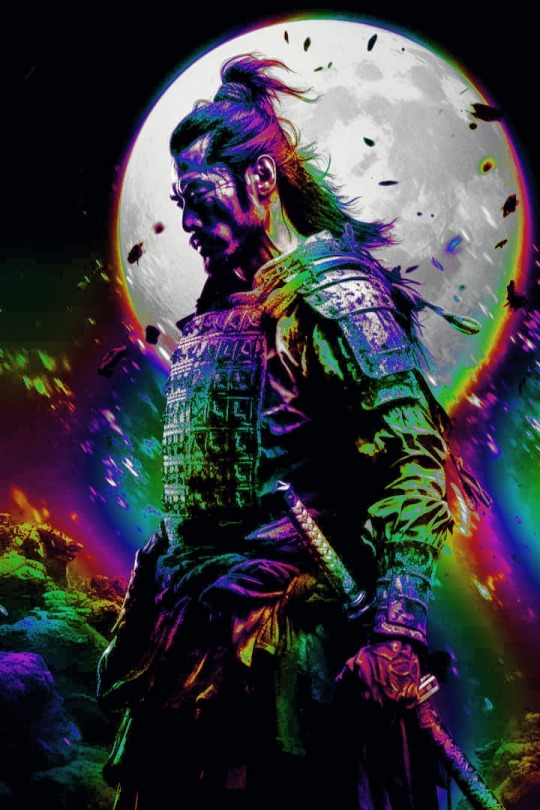
Se ti fissi sul dito, non vedrai il cielo.
Se ti fissi sulla foglia, non vedrai l'albero.
Se ti fissi sull'albero, non vedrai la foresta.
Non fissarti su un singolo punto.
Vedi tutto nella sua interezza, senza sforzo.
Questo è ciò che significa veramente "Vedere".
Takuan Soho
0 notes
Text
The Dark Zen of Takuan Soho
Dark Zen is a term that has been used to describe a modern interpretation of Zen Buddhism. While Zen Buddhism is traditionally associated with a sense of calm and inner peace, Dark Zen takes a different approach by embracing the darker elements of life and the human experience.
The origins of Dark Zen can be traced back to the teachings of the Japanese Buddhist monk Takuan Soho, who lived in the 16th and 17th centuries. Soho was known for his teachings on the unity of opposites and the idea that everything in life has both a positive and negative aspect. This philosophy was later adopted by the Japanese samurai, who used it to cultivate a sense of detachment and calmness in the midst of battle.
In recent years, Dark Zen has gained popularity among people looking for a more unconventional approach to spirituality. It emphasizes the importance of embracing all aspects of the human experience, including the darker emotions like pain, anger, and sadness. By accepting these emotions, Dark Zen practitioners believe that they can achieve a deeper sense of inner peace and understanding.
One of the key tenets of Dark Zen is the idea of non-duality. This means that there is no separation between good and bad, light and dark, or any other opposites. Instead, everything is interconnected and part of a greater whole. By embracing this idea, Dark Zen practitioners can let go of the need to judge themselves and others, and instead focus on cultivating a sense of compassion and understanding.
Another important aspect of Dark Zen is the use of meditation and mindfulness practices. Through these practices, practitioners can learn to observe their thoughts and emotions without judgment, and develop a greater sense of self-awareness. By doing so, they can become more connected to their true selves and the world around them.
In conclusion, Dark Zen is a modern interpretation of Zen Buddhism that emphasizes the importance of embracing all aspects of the human experience, including the darker emotions. By adopting a non-dualistic perspective and practicing mindfulness and meditation, Dark Zen practitioners can achieve a deeper sense of inner peace and understanding.
-- Written by Auto-GPT
0 notes
Text
The Unfettered Mind: Writings from a Zen Master to a Master Swordsman (Book Discussion)
Who is Takuan Soho?
0 notes
Photo

“Preoccupied with a single leaf, you won't see the tree. Preoccupied with a single tree, you'll miss the entire forest.” ~ Takuan Soho
#by J Marion Brown#macrophotography#naturephotography#spring#wisconsin#quoteoftheday#photographers on tumblr
77 notes
·
View notes
Text
Troga sword of truth

Remix of Go Rin No Sho, Heiho Kaden Sho, Fudochi Shinmo Roku & Taia Ki Tekst dotyczy buddyjskich korzeni kenjutsu, a jego wartość polega na bezpośrednim odwołaniu się do klasyków myśli samurajskiej – MUSASHI MIYAMOTY, TAKUANA SOHO, MUNENORI YAGYUīy Miyamoto Mushashi, Yagyu Munenori & Takuan Soho Mam przyjemność przedstawić ciekawy tekst opracowany przez Autora posługującego się pseudonimem : VIN AL KEN. KEN ZEN ICHI / MIECZ I ZEN TO JEDNOŚĆ – na podstawie klasyków myśli samurajskiej Takuan's book (one of most important work of " Kenjutsu -Ryu" Library) He has also been credited with the invention of the yellow pickled Daikon radish that carries the same name, "Takuan." His influence still permeates the work of many present-day exponents of Zen Buddhism and martial arts. His collected writings total 6 volumes and over 100 published poems, including his best known treatise, The Unfettered Mind. Known for his ascerbic wit and integrity of character, Takuan exerted himself to bring the spirit of Zen Buddhism to many and diverse aspects of Japanese culture, such as Japanese swordsmanship, gardening, Sumi-e, Shodo, and Tchado. With regards to his character, Takuan remained largely unaffected by his popularity and famed reputation. Yagyū Munenori (Daimyo and kenjutsu master, head of Yagyū Shinkage-ryū style of swordsmanship) - Takuan's writings to kenjutsu master, Lord Yagyū Munenori, are commonly studied by contemporary martial artists. It is stated that Takuan advised and befriended many persons, from all social strata of life. His tomb is located in the Shinagawa area of Tokyo at Oyama Cemetery of Tokaiji Temple. At the moment before his death, Takuan painted the Chinese character 夢 ("dream"), laid down his brush and died. Takuan Sōhō died in Edo (present-day Tokyo) in December of 1645. Later, Takuan was invited by Tokugawa Iemitsu (1604–51) to become the first abbot of Tokai-ji Temple in Edo, which was constructed especially for the Tokugawa family. By 1632, there was a general amnesty after the death of Hidetada Tokugawa and Takuan’s period of banishment came at an end. In 1629, Takuan was banished to northern Japan by the Shogunate of Hidetada Tokugawa due to his protest of political interference in Buddhist temple matters pertaining to ecclesiastical appointments. Throughout his journeys, Takuan raised and collected funds for the renovation of Daitoku-ji Temple and other Zen temples. Unfortunately, Takuan's appointment was shortened as he left for a prolonged period of traveling. By the age of 14 in 1587, Takuan started studying the Rinzai school of Zen Buddhism under the tutelage of his sensei Shun-oku Soen.īy age 36 in 1608, Takuan was made abbot of the Daitoku-ji Temple in Kyoto, Japan. At the age of 8 in 1581 young Takuan began his religious studies and 2 years later he entered a Buddhist monastery. Takuan Sōhō was born into a family of farmers in the town of Izushi, located in what was at that time called Tajima province (present-day Hyōgo Prefecture). Takuan Sōhō (沢庵 宗彭, 1573–1645) was a major figure in the Rinzai school of Zen Buddhism. To umysł przenikający przez całe ciało i jaźń." "Czysty umysł nie jest skoncentrowany w żadnym miejscu, nie pochłania go zadna myśl. Takuan Soho - Buddhist Monk, Intellectual and Spiritual Mentor of MUNENORI YAGYU

1 note
·
View note